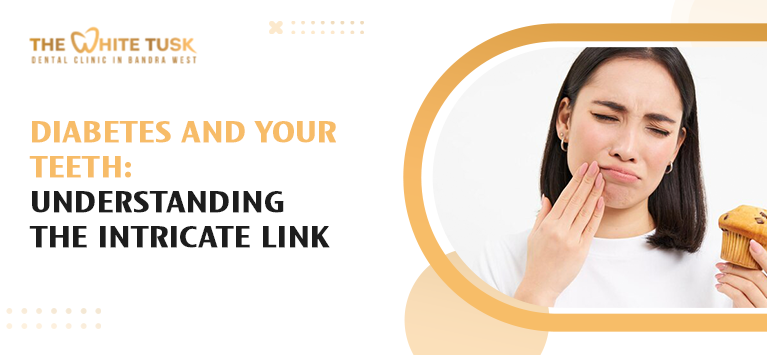
Oral health is not isolated from the rest of the body; all our systems, organs, and cells are interdependent to function, so certain diseases that originate from certain parts can also affect our mouth. This is the case of diabetes, a chronic disease affecting millions worldwide.
Diabetes involves a malfunction of the pancreas that impairs insulin production, which affects our body’s ability to process sugar. Excess sugar in the blood can lead to heart, kidney, or circulatory problems, in addition to oral and dental issues; let’s explore this link in detail in this article.
Diabetes is an endocrine disease, a common symptom of which is the release of large amounts of urine, leading to dehydration. Hence, the name of the different types – from the Greek “diabetes” is translated: “flows, flows out.” The causes of the diseases vary, but the complications are dangerous and, in many ways, similar. Diabetes’s early signs and symptoms may emerge in the mouth. Monitoring your dental health can, therefore, enable early diagnosis and treatment.
Diabetes can manifest itself in three forms: type 1 diabetes, type 2 diabetes, and gestational diabetes.
This condition affects certain women during the fifth month of pregnancy and typically goes away after delivery. It happens when placental chemicals that assist the fetus develop inhibit the action of insulin, causing blood sugar levels to rise. It is frequently controlled by a decent nutritious diet and regular exercise, although the mother may require insulin as well.
If we don’t behave wisely, the connection between diabetes and dental health might cause issues. Diabetes reduces the body’s resistance to infections and slows down the healing process. If left unchecked, it can lead to the breakdown of leukocytes (white blood cells), the body’s primary defence against infection. This is why mouth infections can worsen in people with uncontrolled diabetes.
Diabetes can also decrease salivary flow and increase glucose levels, making it ideal for fungal infections such as candidiasis.
It is critical to strengthen the link between diabetes and dental health. Specialized monitoring must be regular and permanent in both cases to avoid undesirable consequences. The most common oral problems of diabetic patients are:
Let’s analyze the most common diseases in this list and see, through them, how a relationship between diabetes and oral health is established.
When dangerous germs attack your gums, periodontal disease develops. The tissues that keep your teeth in place deteriorate as the disease advances. It can cause uncomfortable, bleeding gums, trouble swallowing, and even tooth loss in its severe stages.
Periodontitis is more prevalent and requires greater care in those with uncontrolled blood glucose levels. This is because they have a lower resistance to infection and a lower ability to recover.
Diabetics may have a greater sugar concentration in their saliva when their blood sugar levels rise and an extremely dry mouth. These circumstances offer an excellent habitat for bacteria to develop. If daily oral hygiene is inadequate, bacterial plaque can quickly build up and stick to tooth surfaces, leading to cavities.
Plaque may be eradicated successfully by cleaning your teeth thoroughly after each meal and utilizing additional accessories such as toothbrushes, floss, and mouthwash.
Oral candidiasis is a fungal infection caused by Candida albicans overgrowth. “Sweet saliva,” a low resistance to infection, and a dry mouth can all contribute to the ease with which oral thrush develops.
This illness commonly appears as white spots on the inside of the cheeks or the tongue, and it can spread to the gums, tonsils, or back of the throat.
To properly treat oral candidiasis, good dental cleanliness and adequate blood glucose levels are required. To address this problem, your dentist may prescribe antifungal drugs.
Diabetes and dental health are inextricably intertwined, and both must be managed to preserve a healthy mouth and a healthy life.
Diabetes patients should pay extra attention to their oral and dental health, as any condition can be exacerbated by decreased resistance to infection and dry mouth.
The most essential thing is to notify your dentist about your diabetes status so that he can examine its influence on your dental health, particularly before any surgical intervention. Furthermore, the better your blood sugar regulation, your resistance to potential infections and related disorders increases.
In conclusion, the connection between diabetes and dental health is undeniable. Diabetes can lead to a higher risk of infections and oral complications. To maintain a healthy mouth and overall well-being, individuals with diabetes must prioritize regular dental check-ups and adhere to recommended oral hygiene practices. Rely on a professional dentist for expert guidance and care.